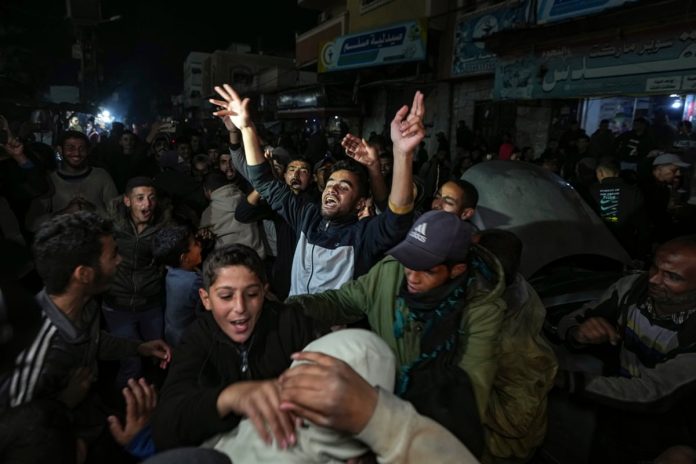Israel and the Palestinian movement Hamas have agreed on a 42-day ceasefire in the first phase, Qatar’s Prime Minister and Foreign Minister Mohammed bin Abderrahman Al-Thani said.
The agreement will come into force on January 19, he said. The two sides also agreed on the release of hostages. Prime Minister of Qatar said:
“Both sides and negotiators agreed to complete all technical procedures tonight, then the Israeli government will finalise internal procedures, after which (…) implementation of the agreement will begin.”
Israel is expected to release 1,000 prisoners from the Gaza Strip detained after October 8, 2023.
Biden outlined the stages of Israel’s deal with Hamas
The incumbent US President Joe Biden said that under the deal reached with the Palestinian Hamas movement, Israel will negotiate a long-term cessation of hostilities within six weeks.
Phase one, Palestinians can also return to their neighbourhoods throughout Gaza. And humanitarian aid supplies in Gaza will begin to increase, and innocent people will be able to get better access to life-saving supplies.
According to the American leader, over the next six weeks Israel will negotiate the necessary steps to achieve the second phase. He explained that if negotiations to end the fighting in Gaza drag on longer than six weeks, the ceasefire will still continue.
At the same time, when the second phase begins, there will be an exchange for the release of the remaining living hostages, including male soldiers. According to the White House chief, all remaining Israeli forces will be withdrawn from Gaza and the temporary ceasefire will become permanent. He added that the third phase would be that any remains of killed hostages would be returned to their families, a major reconstruction plan for Gaza would begin.
Trump’s role in reaching the deal
A senior Biden administration official said that the deal between Israel and Hamas was reached thanks in part to a constructive partnership with the team of United States President-elect Donald Trump, in particular the US leader’s special envoy for the Middle East, Steven Witkoff. Joe Biden’s senior administration official said:
“Steven Witkoff came and hooked up with Brett H. McGurk, Biden’s Middle East adviser, a few days ago in a last ditch effort that I think is historically almost unprecedented. And it’s been a very constructive, very fruitful partnership, and I think both of them will probably talk more about that at some point in time.”
However, according to the New York Post, Biden did not acknowledge Trump’s role in the Gaza ceasefire deal. Speaking at a press conference, the current White House chief said he was proud that Americans would take part in the hostage release, without mentioning Trump’s merits.
Meanwhile, Israeli Prime Minister Benjamin Netanyahu thanked both Trump and Biden for their help with the Gaza ceasefire deal. It is noted that Netanyahu and Trump agreed to meet soon in Washington to discuss this issue and a number of other important topics.
Israeli President Isaac Herzog called the conclusion of the agreement a correct and necessary step. Media showed footage of residents of Tel Aviv and Gaza coming out in spontaneous celebrations. Reuters publishes video of weeping Israelis and Gazans dancing and singing right in the streets.
Hamas is also celebrating the truce. Armed Hamas squads were back on the streets, emerging from tunnels where they had been fighting since October 2023. Hamas congratulated the enclave’s residents on the agreement, but promised that the standoff with Israel would continue.
Shelling continues
Despite the announced agreement, the Israeli army launched a massive strike on Gaza in the early hours of January 16. According to preliminary reports, 30 people were killed.
The previous official truce between the sides lasted a week – from November 24 to December 1, 2023. Since then, Israel and Hamas have been declaring plans to destroy each other and then softening their rhetoric. All this time, the US, Qatar and Egypt were actively involved in the negotiations, but only with Donald Trump’s rise to power in the US was it possible to move the process forward.
Not long ago, Trump promised “hell to pay” if a deal to release Hamas prisoners was not concluded before he entered the White House on January 20. It was probably these threats that became the last argument in the negotiations.
